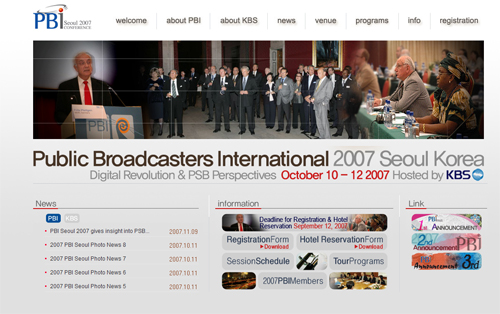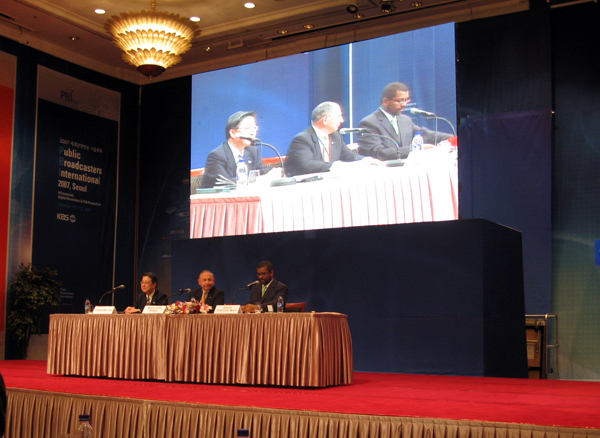 The theme of PBI 2007 was on Digital Revolution and PSB Perspectives.
The theme of PBI 2007 was on Digital Revolution and PSB Perspectives. PBI members discussed and shared views on issues they faced.
PBI members discussed and shared views on issues they faced.The Hong Kong government initiated a Public Service Broadcasting Review in Jan 2006. One of the reasons for conducting this review is the clash of interests created by the dual role of RTHK. Not only is it Hong KongÕs only PSB, it is also a government department. RTHK is government funded. At the same time, it has developed a high degree of editorial independence. We provide an open platform for public discussion, and that includes comments that are critical of the government. Some local commentators have described RTHK as a "naughty child who bites the hand that feeds it". But, the fundamental question is: just whom do these feeding hands belong to? The public or the government itself?
Funding Arrangement
The Broadcasting Review Report was published in March this year, containing suggestions and recommendations on the accountability, governance, programming and funding of a future PSB in HK. The government will soon conduct a territory-wide public consultation to formulate a roadmap for the development of PSB.
I won't go into the details of the report. Instead, the focus of my speech today is on the "feeding" part. The existing funding model and the administrative hurdles that bureaucratic red tape has created for RTHK may also provide some food for thought for our fellow public broadcasters. At present, RTHK operates on a cash budget of around US$58 million per year. This covers our radio, television, educational television, and new media output. In terms of the government's overall financial budget for 2007-2008, our allocation ranks only 45th out of 82 government departments. Each Hong Kong citizen pays just about US$8.6 per year to enjoy our high quality radio, television and new media services. This is comparatively much lower than the individual public contribution to major PBIs like ABC, BBC, KBS or NHK.
The current funding of the station is dependent on the GovernmentÕs General Revenue on an annual basis. It is marginally supplemented by a limited amount of non-commercial sponsorship of programmes or special projects. We are not allowed to receive donations or commercial advertisements for any of our programmes. This government funding arrangement ensures that RTHK operates under no commercial pressure. However, under this system, resource allocation on an annual basis is rather inflexible. That has made it difficult for us to plan for long-term investment and strategies in the digital future. Financial sustainability is yet another problem. As a result, RTHK remains relatively ÒslowÓ in migrating from analogue to digital production. Neither our building nor our equipment is up to standard in the era of the digital revolution. We have been fighting for a new building for more than 10 years. And we will continue to do so.
In our submissions to the PSB Review Committee earlier, we recommended some guiding principles for the funding sources and financing arrangements for the new PSB. Let me take this chance to share with you our thoughts, as well as some major suggestions that have come from the Hong Kong society. We believe that any PSB should have actual and perceived operational independence from both the government and the commercial market. We believe its funding should be sustainable and acceptable to the public, widely and deeply rooted among the population to promote a sense of public ownership. It should be accountable to the public. Its financing should be stable and sufficient for long-term planning and technological investments in the new media environment. The station's financial model should be a mixture of stable public funding and alternate sources for recurrent expenditure. There should also be a development fund for capital projects.
On the basis of the above principles, we believe that the funding should primarily be public. Options that could be considered include having direct government funding on a 3 to 5 year basis, introducing a household licence fee, or setting the financial allocation at a certain percentage of government expenditure. Apart from public funding, the PSB could explore the option of developing other funding sources to find supplementary income. It should be able to accept public donations, with arrangements in place to ensure that there will be no actual or perceived interference from major donors. Other income sources could include non-commercial and commercial sponsorship, marketing of programmes, and sales and marketing of merchandise such as programme related souvenirs and publications. In all this, the basic principle of a healthy funding model should be that it is stable, predictable and sustainable. Most important of all, it should be free from political and commercial influences.
The report published by the PSB Review Committee laid down some recommendations regarding the issue of public funding. To our relief, their suggestions are quite in line with our submission. The committee suggested that a "combined funding model" should be adopted for a PSB, with government appropriation as the primary source. They agreed that a public broadcaster may also raise funds from supplementary sources such as commercial sponsorships (although not for news and current affairs programmes); donations; voluntary subscriptions; pay-per-view fees for on-demand services; and programme and merchandise sales. They also highlighted that PSB funding should come under a separate head of expenditure and that it should adopt a three to five-year funding cycle to allow greater flexibility and financial planning and to reduce exposure to extraneous political and financial negotiations.
Achieving this will not be easy. First, we have to overcome a number of hurdles in the present bureaucratic structure. Second we have to face potential opposition from our commercial counterparts in competing for advertisement and donations. They, understandably, have concerns about this.
Future Challenge In RTHK's case, capital projects for broadcast facilities are funded by the government through an annual bidding process. One example is the replacement of a TV OB Van. It took us several years to obtain funding approval for this as it had to compete with many other government projects. Depending on the complexity of system requirements, the implementation of such a project could take two or more years. Over such a period, broadcast technologies are likely to have made quantum leaps, particularly with regard to the changes from analogue to HD. By the time we get the equipment, it's likely to be out of date. In addition to the rigour of government budgeting and control processes, major projects often involve the joint efforts of one or more other government departments. It remains a challenge to shorten the lengthy combined budgeting and implementation cycle, in order to cope with fast technological development.
Public service broadcasters work for the public, and serve the public interest. To do this well, they need a stable, predictable and sustainable financial background. Today, the future of RTHK is uncertain. The Review Report has initiated discussion on the future of public service broadcasting in Hong Kong. It's our hope that the Hong Kong's future public broadcasting corporation will be a restructured RTHK, supported by a financial framework that complements our creative energy, strength, and dedication, so that we can grow and excel in the digital age.


